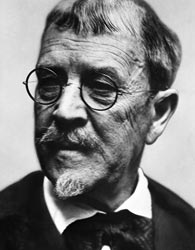Lincoln Steffens was an American journalist active during the early 20th century. A famous muckraker, Steffens is remembered for pioneering a style of critical, investigative reporting that centered on covering the misdeeds of civic and corporate leaders. Such journalism aimed to create public outrage and spur political reform.
Lincoln Steffens’ Early Days
Lincoln Steffens was born in Northern California on April 6, 1866. The son of a successful businessman, he attended a military academy during his youth.
His higher education began at the University of California, Berkeley, and continued in Europe after his graduation. Britannica reports that Steffens studied psychology with Wilhelm Wundt in Germany and with Jean-Martin Charcot in France.
After returning from Europe, Steffens worked for nine years as a newspaper reporter and editor in New York City. His journalistic career commenced with an apprenticeship at the New York Evening Post in the early 1890s.
Sources in this Story
- Encyclopedia Britannica: Lincoln Steffens
- Encyclopedia.com (The Historian): Apprenticing reporters
- History Matters: The Shame of the Cities: Steffens on Urban Blight
- The New York Times: Municipal Misrule
- Encyclopedia.com (The Oxford Companion to United States History): Steffens, Lincoln
- The New York Times: ‘The Shame’ That Lincoln Steffens Found Has Not Left Our Country
Notable Accomplishments
In 1901, Steffens was hired as managing editor at McClure’s Magazine, where he became noted for publishing critical stories in which he exposed civic corruption. Corruption stemming from the confluence of politics and business was a primary target. He was a prolific writer, and his work at the magazine was assembled into a collection and published as the classic, “The Shame of the Cities,” in 1904.
In a review of the book that appeared at the time of its publishing, The New York Times summarized Steffens’ arguments and approach, saying, “Mr. Steffens insists and reiterates and insists again that in the misgovernment of American cities ‘no one class is at fault, nor any one breed, nor any particular interest or group of interests. The misgovernment of the American people is misgovernment by the American people.’”
Along with Ida Tarbell, Ray Stannard Baker and Upton Sinclair, Steffens practiced an original brand of “investigative, adversarial journalism,” opposed by many, including the highest-ranking American politicians. President Theodore Roosevelt condemned the group for their seemingly singular focus on covering the negative aspects of society, and branded them “muckrakers.” Though President Roosevelt used the term pejoratively, Steffens and his contemporaries embraced the fitting label.
Steffens continued writing his exposés until 1910 when he reported on the Mexican revolution. During this period he developed sympathy toward the rebels, and toward revolution as a means of political change.
The Man and His Work
The Rest of the Story
Steffens’ criticism of American politics contrasted with his controversial praise of Russia. He visited Petrograd—now St. Petersburg—in 1919. While there he penned the famous line, “I have seen the future; and it works,” in a letter to a friend, according to Britannica.
A rare convert to socialism among his muckraking peers, his praise of communism would not endure. At the publication of his “Autobiography” in 1931 he had become disenchanted with the political system.
Steffens’ contributions to journalism remain relevant today, decades after his death in 1936. His name, philosophy and journalistic approach are invoked regularly by writers who take issue with those who govern. In a 2004 New York Times editorial, “‘The Shame’ That Lincoln Steffens Found Has Not Left Our Country,” legal writer Adam Cohen aptly summarizes Steffens’ work, and draws parallels between the United States at the turn of the 20th century and in 2004.
Cohen writes, “‘The Shame of the Cities,’ one of the great works of American muckraking, turns 100 this spring, but it speaks uncannily to our times. In this age of Enron and Halliburton, of huge campaign contributions and reckless deregulation, its arguments about the corrosive effect of business on government feel up to the minute. Every bit as timely is its call to arms.”
This article was originally written by James Sullivan; it was updated March 3, 2017.











